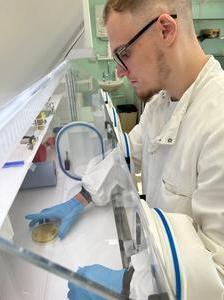Meet Harry Smith Vacation Studentship recipient: Sonny Hart

What is your name and institution?
Sonny Hart, The Open University
What inspired you to go into this field of work?
I applied for the studentship to obtain hands-on experience in the lab. The Open University is a distance learning institution and excels in the standard of education it delivers, but opportunities to gain lab experience are not as common as they are at face-to-face universities. Therefore, the studentship offered me a fantastic opportunity to put theory into practice and begin my career in science.
How did you feel when you found out your application was successful?
I felt both excited and nervous. I was excited as this was the first time I could participate in meaningful research. Alongside this, I knew I would spend substantial time on campus, meeting new people, whilst receiving a first-class education in the lab. However, beyond the excitement, there were definitely some nerves at the beginning as this was the first time in my life spending substantial lengths of time each week away from home. I was also leaving my comfort zone entirely, doing something I had never done before with people I had never met before. The nerves, however, quickly evaporated once I settled in and after just a couple of weeks, I found myself having the time of my life. The success of my application has definitively transformed the trajectory of my future.
How would you go about explaining your research to someone who may not understand science?
I would begin by explaining that the gut microbiota is a collection of microbes in our gut, containing an abundance of “good bacteria” which helps us to digest various types of food and protects us against “bad bacteria”. The microbiota is damaged by antibiotic treatment, leaving a power vacuum (excess of available nutrients) for the pathogen C. diff to exploit. C. diff is an example of “bad bacteria” that kills tens of thousands of people each year and is highly resistant to antibiotics. It thrives in hospital environments, where the use of antibiotics is common. Once C. diff colonises the gut, the resultant infection is very difficult to treat, meaning that new treatment options are required.
A bacteriophage or phage for short, is a virus that infects only bacteria and they can follow one of two lifecycles. In one lifecycle, the lytic lifecycle, the phages hijack the cellular machinery of the bacteria and use it to produce more copies of the phage virus which then kill their bacterial prey by bursting it open from the inside. This allows the new phage copies to infect other bacterial cells and in turn, kill them. Alternatively, they can follow a temperate lifecycle, in which, instead of immediately making new phage virus copies, they insert their DNA into the chromosome of the bacteria and lie dormant until conditions convert the phage to a lytic lifecycle. These aren’t very effective at killing their bacterial prey.
We wanted to remove a particular temperate phage from the bacterial chromosome. The goal here was to obtain a version of C. diff with the phage DNA removed, which could be used at a later date, as a test subject for phage infection experiments with genetically modified versions of the same phage. These genetic modifications would carry ‘lethal cargo’ which would kill the C. diff, creating new, non-antibiotic therapeutic options for fighting C. diff infection.
What have you learnt from your experience?
I started my studentship with no lab experience whatsoever, and very basic knowledge of the field of microbiology. I now know how to competently use common equipment required in microbiology labs and biology labs in general, and learnt a great deal about plasmid cloning, microbiological culturing, anaerobic microbiology and the scientific industry as a whole. I also learnt crucial research techniques including PCR, gel electrophoresis, gel extraction and plasmid extraction, which are relevant to biological disciplines more broadly.
Overall, I would describe my studentship as a crash course in the lab, as my knowledge has risen from zero to a degree of competency. I was not at all expecting that level of progression at the start of the summer. For this, I am very thankful to both my supervisor, Dr Terry Bilverstone, and the Microbiology Society for the opportunity to learn what I have and hopefully make a positive contribution towards the future treatment of the disease.
How do you think this vacation will help your career progression?
I feel that the studentship is going to act as a springboard into my master’s degree and career. I am currently entering the third year of my undergraduate degree and intend to pursue a master’s in biotechnology. The program I want to do requires me to have experience with techniques such as PCR and gel electrophoresis, which I have gained during my studentship. I also feel that just being in an academic environment throughout the summer, and having the opportunity to ask questions about the industry has helped me to define the career path I would like to follow and how to get there. Overall, the studentship has had an enormous effect on the progression of my career.
Why is support, such as this grant provided by the Microbiology Society, so important?
Without grants such as this one, students like myself would not have as many opportunities to gain experience in science. I feel that this would be a net deficit for the scientific industry. Without the hands-on experience I gained this summer, I feel that I may have struggled to find a route into the industry and that this will be the same for many other students too. I, therefore, feel that without these kinds of grants, the scientific industry is somewhat walled off to those less well-connected, or lacking the necessary experience to pursue the career they want to.
